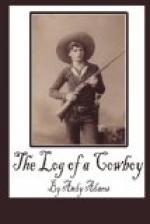“When I heard the old man throw his heavy boots on the floor in the next room, I realized that I was left all alone with their charming daughter. All my fears of the early part of the evening tried to crowd on me again, but were calmed by the girl, who sang and played on the piano with no audience but me. Then she interested me by telling her school experiences, and how glad she was that they were over. Finally she lugged out a great big family album, and sat down aside of me on one of these horsehair sofas. That album had a clasp on it, a buckle of pure silver, same as these eighteen dollar bridles. While we were looking at the pictures—some of the old varmints had fought in the Revolutionary war, so she said—I noticed how close we were sitting together. Then we sat farther apart after we had gone through the album, one on each end of the sofa, and talked about the neighborhood, until I suddenly remembered that I had to go. While she was getting my hat and I was getting away, somehow she had me promise to take dinner with them on Christmas.
“For the next two or three months it was hard to tell if I lived at my boarding house or at the brick. If I failed to go, my landlady would hatch up some errand and send me over. If she hadn’t been such a good woman, I’d never forgive her for leading me to the sacrifice like she did. Well, about two weeks before school was out, I went home over Saturday and Sunday. Those were fatal days in my life. When I returned on Monday morning, there was a letter waiting for me. It was from the girl’s mamma. There had been a quilting in the neighborhood on Saturday, and at this meet of the local gossips, some one had hinted that there was liable to be a wedding as soon as school was out. Mamma was present, and neither admitted nor denied the charge. But there was a woman at this quilting who had once lived over in our neighborhood and felt it her duty to enlighten the company as to who I was. I got all this later from my landlady. ‘Law me,’ said this woman, ’folks round here in this section think our teacher is the son of that big farmer who raises so many cattle and horses. Why, I’ve known both families of those Quarternights for nigh on to thirty year. Our teacher is one of old John Fox’s boys, the Irish Quarternights, who live up near the salt licks on Doe Run. They were always so poor that the children never had enough to eat and hardly half enough to wear.’




